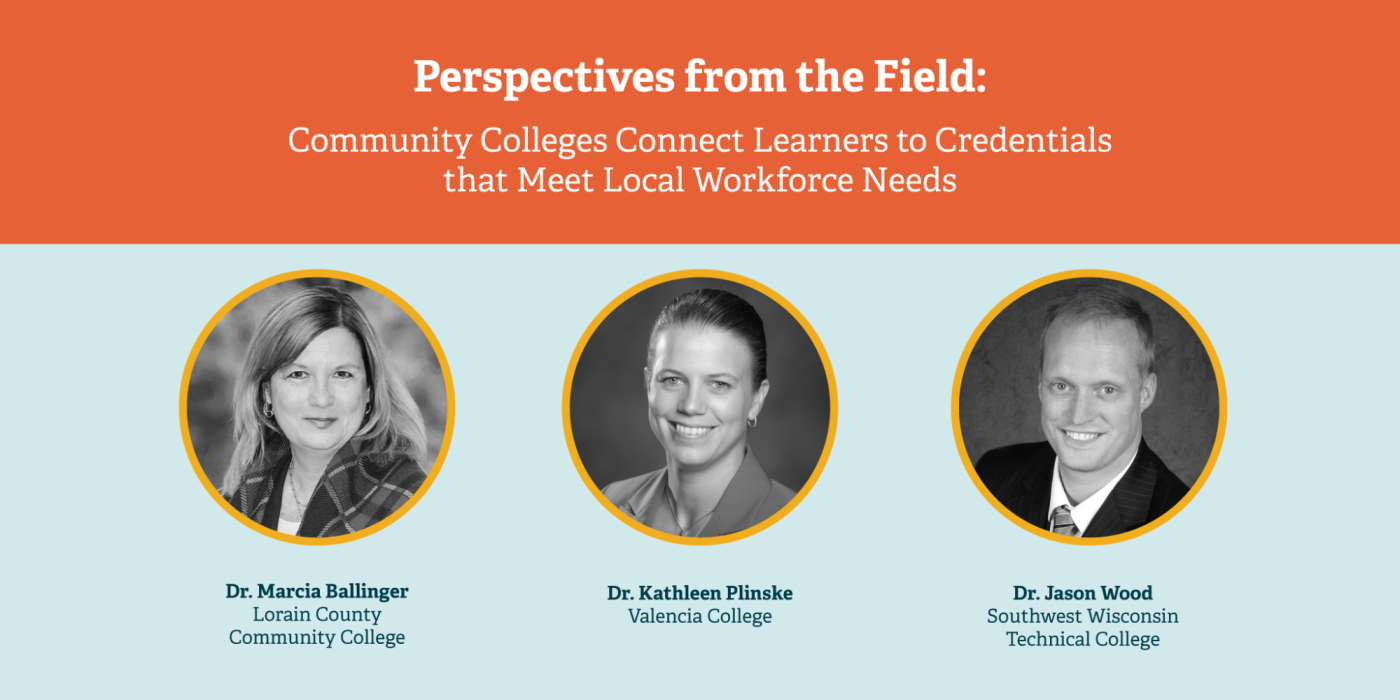
Perspectives from the Field: Community Colleges Connect Learners to Credentials that Meet Local Workforce Needs
 As we emerge from the COVID-19 health crisis and face a shaky economy, public confidence in the value of postsecondary education has wavered. Learners from low-income backgrounds, in particular, want affordable paths to careers with good wages. However, data from First Gen Ahead shows that these learners are more likely to find themselves unemployed, underemployed or in jobs with low economic payoff. At the same time, regional labor force needs in many communities are going unmet. Community colleges are an important part of the solution to both these issues.
As we emerge from the COVID-19 health crisis and face a shaky economy, public confidence in the value of postsecondary education has wavered. Learners from low-income backgrounds, in particular, want affordable paths to careers with good wages. However, data from First Gen Ahead shows that these learners are more likely to find themselves unemployed, underemployed or in jobs with low economic payoff. At the same time, regional labor force needs in many communities are going unmet. Community colleges are an important part of the solution to both these issues.
At Ascendium, our philanthropy prioritizes support for scalable postsecondary education practices that yield strong workforce outcomes for learners from low-income backgrounds. We talked to leaders from three community colleges participating in a new initiative led by the Aspen Institute College Excellence Program and the Community College Research Center about their role in creating upward mobility and meeting local workforce needs. The Unlocking Opportunity Program supports 10 community colleges across the nation who are identifying and implementing high-value credentials — or those that lead to good jobs and transfer opportunities — with the goal of moving more learners into these pathways.
Lorain County Community College
Lorain County Community College (LCCC), located in northeast Ohio’s rustbelt, is transforming opportunities for students and the community. Since 1963, one in four Lorain County residents has taken classes at LCCC and more than 43,000 have earned a degree or certificate. At LCCC, dual enrollment, employer partnerships, apprenticeships and learn and earn programs encourage enrollment in and completion of high-value credentials. For example, 80% of new LCCC students last year enrolled via such programs, or the “side door,” as LCCC President Dr. Marcia Ballinger calls it, underscoring the priority of meeting learners where they are. We talked to Dr. Ballinger about LCCC and what it hopes to achieve as part of the Unlocking Opportunity Program.
Q: What motivated you to participate in the Aspen Institute Unlocking Opportunity Program, and what do you hope to achieve in doing so?
The Unlocking Opportunity Program is about how to organize the college around high-value credentials so that graduates and their families can move up the socioeconomic ladder. It provides a platform and engagement strategy to connect with peer institutions and bring a laser focus on supporting careers of high value.
The timing for LCCC couldn’t be better. Over the past 18 months, we have rolled out a program called Careers by Design, a research-based initiative that aligns credentials not only to current job openings but also to future needs. At the same time, it addresses the areas where minoritized and under-resourced populations are missing.
Looking to the future is important. For example, LCCC recently hosted 28 colleges and universities for a convening of the Midwest Semiconductor Network. Ohio is poised to become the Silicon Heartland as Intel invests $20 billion in Ohio-based chip manufacturing. LCCC is focused on preparing learners for high-demand, high-value jobs that will change the trajectory of students’ lives and create a more vibrant community.
Q: Why is the work important, and what might be the broader implications of what you learn for the field?
Everyone can learn from this community of practice. We can expand how colleges use data and understand how it informs the regional and economic development ecosystem linking them to K-12, employer partners and community partners. This illustrates how it looks to be more deliberate about aligning systems to high-value credentials.
Valencia College
Valencia College supports 70,000 students annually across multiple campuses in the Orlando, Florida, metropolitan area. Like LCCC, Valencia leverages strong partnerships to position learners to meet future workforce needs. With a population that is more than 50% students of color and first generation, Valencia takes pride in helping these learners meet their career goals. As a first-generation graduate herself, Valencia President Dr. Kathleen Plinske believes that anyone can learn anything under the right conditions and that it is up to the institution to identify and work to create those conditions. She talked to us about her vision for the Unlocking Opportunity program and flipping the script on who goes to college.
Q: What motivated you to participate in the Aspen Institute Unlocking opportunity program, and what do you hope to achieve in doing so?
The Unlocking Opportunity Program aligns with an organizational restructuring initiative at Valencia. We are thinking about all our programs in a coherent way and blurring the lines between four week-long programs, the baccalaureate programs and everything in between. Valencia students have had great success with transfer to the University of Central Florida (UCF) through our DirectConnect to UCF program, which guarantees admission for students who complete an associate degree. I’d like to be able to guarantee career pathways that lead to greater prosperity the same way we guarantee transfer.
Q: Why is the work important, and what might be the broader implications of what you learn for the field?
It is my hope that we become one of the very first community colleges in the country that does not see disparity in outcomes when disaggregating by gender, first-generation, race/ethnicity, Pell or any other measure, while still holding all of our students to the same high standard of excellence. Then we can set that as the expectation and the norm for others.
Southwest Wisconsin Technical College
Southwest Wisconsin Technical College (SWTC) is a rural institution serving just under 2,000 students. Employer partnerships play an important role in its efforts to prepare local learners for meaningful careers and to meet regional workforce needs. Like all technical colleges, at SWTC, every program has an advisory committee. But at SWTC, these groups comprise industry partners, employers and alumni who provide critical feedback that the college takes seriously to update curriculum and ensure their learners' readiness to take in-demand jobs. As an example, the area hosts seven regional critical access hospitals that were unable to fill surgical technology positions. Now, SWTC is offering the only surgical technology program in the area. SWTC President Dr. Jason Wood talked to us about their work.
Q: What motivated you to participate in the Aspen Institute Unlocking Opportunity Program, and what do you hope to achieve in doing so?
SWTC’s strategic direction emphasizes post-graduation success and equitable outcomes for learners from low-income backgrounds and students of color. Our desire to make sure every student is set up to either earn a bachelor's degree or a high-value credential. In addition, we have just been approved to build a liberal arts transfer degree. This is an opportunity to work with colleges with best practices in place. Having access to experts in the field from around the country, for a small rural college, presents a rich network that will benefit students.
Q: Why is the work important, and what might be the broader implications of what you learn for the field?
We have the opportunity to look at data about our students after they graduate and understand their salary growth, their satisfaction and happiness with how we prepared them for work and the perspective of the employers about how well they were prepared. Across postsecondary education, we are wrestling with the concept of return on investment, or what does a learner get back for the time and tuition they put in. Since this is emerging work, we are excited about the opportunity to share our successes and to lead efforts for other colleges who are trying to do the same thing.
Ascendium is grateful to these college partners for sharing their reflections on the importance of streamlining transitions between postsecondary education and the workforce. Our investment in Unlocking Opportunity Program is part of our broad commitment supporting work that scales postsecondary education practices resulting in strong workforce outcomes, especially for learners from low-income backgrounds.


